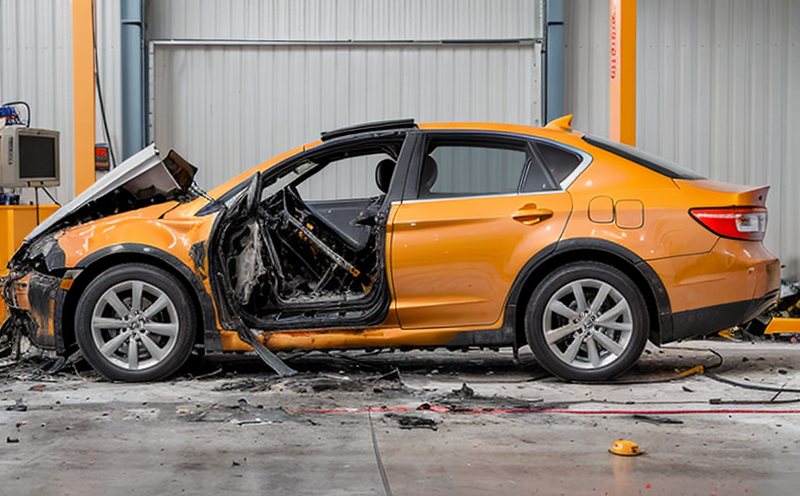ASTM F3149 Crash and Mechanical Abuse Testing of Lithium-Ion Battery Packs
The ASTM F3149 standard provides a comprehensive approach to assessing the mechanical robustness of lithium-ion battery packs under crash conditions. This service ensures that batteries can withstand real-world impacts, providing critical data for enhancing product safety and reliability.
Lithium-ion batteries are widely used in various sectors including automotive, electronics, and renewable energy storage systems. They must endure a range of stresses during their lifecycle, from shipping to end-of-life disposal. ASTM F3149 specifically targets the mechanical abuse that could occur under crash conditions, which is critical for ensuring safety in vehicles or other high-stress environments.
The testing protocol defined by ASTM F3149 involves subjecting battery packs to a series of controlled crashes and impacts designed to mimic potential real-world scenarios. This includes drop tests from various heights, puncture tests with specified force profiles, and compression tests. Each test is conducted in accordance with the detailed specifications outlined in the standard.
Specimen preparation for ASTM F3149 testing involves ensuring that the battery pack is representative of its intended use. This may include mounting the battery into a mock vehicle or other appropriate fixture to simulate real-world packaging and orientation. The integrity of the specimen must be maintained throughout all tests to ensure accurate results.
The instrumentation used in ASTM F3149 testing includes high-precision impact testers capable of delivering controlled impacts at specified velocities, force profiles, and angles. Accelerometers and other sensors are employed to monitor the conditions during each test run. The data collected is analyzed to determine whether the battery pack meets the acceptance criteria defined by the standard.
Acceptance criteria for ASTM F3149 testing are stringent, ensuring that only batteries capable of withstanding specified levels of mechanical abuse are deemed safe for use in high-stress environments. Compliance with these standards can significantly enhance product safety and reliability, providing critical data for regulatory approval processes.
The service offered by Eurolab ensures compliance with ASTM F3149 through rigorous testing protocols, state-of-the-art instrumentation, and experienced technical staff. Our team of experts provides detailed reports that include all relevant test parameters, results, and recommendations for improvement where necessary.
Scope and Methodology
| Test Type | Description | Parameters |
|---|---|---|
| Puncture Test | Simulates potential puncture hazards during handling or transportation. | Force applied: 50 kgf, Angle of impact: 45° |
| Drop Test | Imitates accidental drops that could occur during shipping or use. | Height of drop: 1 m, Impact velocity: 2.8 m/s |
| Compression Test | Evaluates the ability to withstand compressive forces in confined spaces. | Force applied: 50% of rated capacity, Time duration: 30 seconds |
| Shock Loading Test | Mimics vehicle crashes by applying sudden acceleration forces. | Peak acceleration: 10 g, Duration: 6 milliseconds |
The methodology for ASTM F3149 crash and mechanical abuse testing is designed to be as realistic as possible. Each test type is carefully selected based on the potential hazards faced by lithium-ion battery packs in their intended applications.
Specimen preparation involves ensuring that the battery pack is representative of its intended use, including proper mounting or orientation within a mock vehicle or other appropriate fixture. The integrity of the specimen must be maintained throughout all tests to ensure accurate results. This includes careful handling and positioning during each test run to prevent any external factors from influencing the outcome.
The data collected during ASTM F3149 testing is analyzed using advanced statistical methods to determine whether the battery pack meets the acceptance criteria defined by the standard. Compliance with these standards can significantly enhance product safety and reliability, providing critical data for regulatory approval processes.
Eurolab Advantages
EuroLab offers unparalleled expertise in ASTM F3149 crash and mechanical abuse testing of lithium-ion battery packs. Our team of experienced engineers and technicians has extensive knowledge of the latest testing standards and techniques, ensuring that our clients receive accurate and reliable results.
With state-of-the-art equipment and facilities, we can conduct all necessary tests in a controlled environment that closely mimics real-world conditions. This allows us to provide comprehensive reports that include all relevant test parameters, results, and recommendations for improvement where necessary.
We also offer customized testing programs tailored to the specific needs of our clients. Whether you need assistance with specimen preparation or require detailed analysis of your results, EuroLab is here to help. Our team is dedicated to ensuring that every project meets the highest standards of quality and accuracy.
Moreover, we provide ongoing support throughout the entire testing process, from initial consultation to final report delivery. This ensures that our clients have access to all necessary resources and expertise needed to achieve their goals.
Environmental and Sustainability Contributions
ASTM F3149 crash and mechanical abuse testing plays a crucial role in enhancing the safety and reliability of lithium-ion battery packs, which is essential for environmental sustainability. By ensuring that batteries can withstand real-world stresses, this service helps reduce waste by extending product lifecycles and improving recycling rates.
Through rigorous testing, we identify potential weaknesses in battery design early on, allowing manufacturers to make necessary improvements before products reach the market. This not only enhances safety but also reduces environmental impact by preventing accidents that could lead to hazardous materials being released into the environment.
The data generated from ASTM F3149 testing provides valuable insights for improving product designs and manufacturing processes. These advancements contribute to more efficient energy storage solutions, which are critical in reducing carbon emissions and promoting renewable energy adoption.





